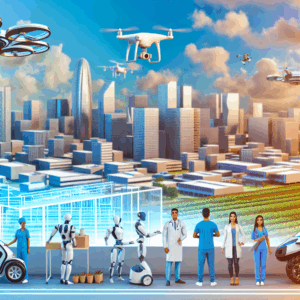China’s Autonomous Agent, Manus, Changes Everything
In the rapidly evolving landscape of artificial intelligence and robotics, China has made significant strides with the development of its autonomous agent, Manus. This cutting-edge technology is poised to revolutionize various sectors, from military operations to civilian industries, and has profound implications for global geopolitics. In this blog post, we will delve into the capabilities of Manus, its technological advancements, applications across different sectors, and the ethical considerations surrounding its deployment.
Introduction
China’s Manus represents a leap forward in AI and robotics, offering unprecedented autonomy and adaptability. As we explore the intricacies of this technology, we will examine its potential to reshape industries and influence international relations. This blog aims to provide a comprehensive overview of Manus, its innovations, applications, and the broader implications for the world.
Section 1: What is Manus?
Manus is an advanced autonomous agent designed to operate with a high degree of independence, leveraging sophisticated AI algorithms to navigate complex environments and execute tasks efficiently. While specific technical details about Manus are limited, its development reflects China’s commitment to pushing the boundaries of AI and robotics.
Key Features of Manus:
- Autonomy: Manus is capable of making decisions without human intervention, using real-time data to adapt to changing situations.
- AI Integration: It incorporates advanced machine learning models to enhance its decision-making capabilities and improve performance over time.
- Operational Flexibility: Manus can be deployed in various settings, from military operations to civilian applications, showcasing its versatility.
Section 2: Technological Advancements
The development of Manus highlights significant technological advancements in AI and robotics. China has been at the forefront of AI research, with innovations in areas such as large language models and reinforcement learning contributing to Manus’s capabilities.
Innovations in AI:
- Large Language Models (LLMs): These models enable Manus to process and understand complex data, facilitating more accurate decision-making.
- Reinforcement Learning: This technique allows Manus to learn from its environment and improve its performance over time, enhancing its autonomy.
Section 3: Military Applications
Manus’s potential military applications are substantial, offering enhanced strategic capabilities and operational efficiency. Autonomous agents like Manus can be used for surveillance, tactical planning, and execution of missions in challenging environments.
Military Implications:
- Enhanced Surveillance: Manus can gather critical intelligence without risking human lives, providing real-time data for strategic planning.
- Tactical Flexibility: Its ability to adapt to changing battlefield conditions makes it a valuable asset for military operations.
Section 4: Civilian Applications
Beyond military use, Manus can significantly impact civilian sectors such as healthcare, logistics, and urban management. Autonomous agents can streamline processes, improve efficiency, and reduce costs in these industries.
Civilian Use Cases:
- Healthcare: Manus could assist in patient care, manage medical supplies, and help in emergency response situations.
- Logistics: It can optimize supply chain management, enhance delivery efficiency, and reduce operational costs.
Section 5: Global Geopolitical Impacts
The development of Manus positions China as a leader in the global AI race, with significant implications for international relations and geopolitical dynamics. This technological advancement can influence China’s foreign policy and its role in global governance.
Geopolitical Implications:
- Global Influence: Manus demonstrates China’s capability to develop cutting-edge technology, potentially enhancing its global influence.
- Strategic Partnerships: The development of Manus may lead to new strategic partnerships and collaborations in AI research and development.
Section 6: Ethical Considerations
As with any advanced AI technology, there are ethical considerations surrounding Manus. Issues such as privacy, job displacement, and accountability are critical and require careful consideration.
Ethical Concerns:
- Privacy and Security: The use of autonomous agents raises concerns about data privacy and security, particularly in sensitive applications.
- Job Displacement: The automation of tasks could lead to job displacement in certain sectors, necessitating strategies for workforce adaptation.
Conclusion
China’s Manus autonomous agent represents a significant milestone in AI and robotics, offering both opportunities and challenges. As we look to the future, it is crucial to address the ethical implications and ensure that such technologies are developed and deployed responsibly. The impact of Manus will be felt across multiple sectors, shaping not only China’s technological landscape but also its position on the global stage.
External Links:
- Defense One – For insights into AI and military applications, visit Defense One.
- Lawfare – Explore discussions on AI and geopolitical implications at Lawfare.
Note: This blog post aims to provide a comprehensive overview of China’s Manus autonomous agent. However, specific technical details about Manus may be limited due to the nature of the technology and available information.





